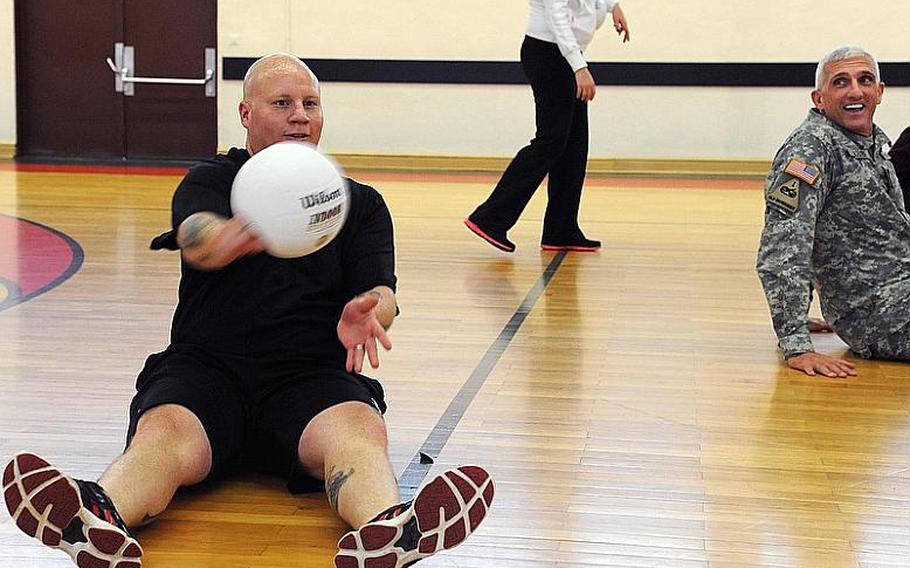
Sgt. Douglas Ritchie of the Heidelberg, Germany, Warrior Transition Unit serves during a game of sitting volleyball as teammate Lt. Gen. Mark Hertling, the USAREUR commander watches on Nov. 8, 2011. Paralympic instructors from the States led an adaptive sports clinic for warrior transition unit soldiers in Europe, as well as for WTU and Army morale, welfare and recreation staff, so the latter can incorporate a modified sports program at their bases for injured servicemembers and their families. (Michael Abrams/Stars and Stripes)
KAISERSLAUTERN, Germany — Volleyball at the gym: Soldier players reaching for the ball, guarding the net, cheering each other on and laughing. Typical? The net was just inches from the floor, where the players sat with their legs stretched out in front of them.
This was volleyball paralympic style, a game with different rules, a lower net and a ton of scooting and sliding. But, the sweaty soldiers said it seemed no less strenuous than playing on one’s feet; it was just easier on their battered bodies.
Many of the men and women playing Tuesday at the gym on Kleber Kaserne were members of warrior transition units in Germany, mending from injuries sustained in combat, recreation or on the job. Most can’t participate in routine Army physical training of two-mile runs, push-ups and sit-ups, and team sports that require running or jumping may not be an option either.
That would seem to limit their choices for physical conditioning, but the Army is hoping to change that through collaboration with the United States Olympic Committee’s Paralympic Division.
U.S. paralympic instructors, in partnership with Army warrior transition units, have been conducting adaptive sports clinics in the States to develop fitness programs for injured military personnel. The aim is to help the injured rehabilitate and improve their quality of life, whether they remain in the Army or transition into civilian life, officials said.
The Defense Department “reached out to the U.S. Olympic Committee: ‘We need your help. How can we get our warriors engaged in sports again?’ ” said Heidi Grimm Powell, USOC Paralympic Division military program associate director.
The committee brought their adaptive sports seminar to Germany this week at the request of Warrior Transition Battalion-Europe, an organization that oversees 10 warrior transition units in Germany and Italy and some 125 soldiers, said Chris Buscema, a physical therapist for the battalion.
The most common injuries seen among the battalion’s soldiers are post traumatic stress disorder, traumatic brain injury, and chronic orthopedic ailments such as a bad back, knee or ankle, Buscema said.
But those injuries weren’t evident during sitting volleyball, as Lt. Gen. Mark P. Hertling, U.S. Army Europe commander, observed. Hertling stopped by the gym on Tuesday and played in a game, remarking afterward that he actually worked up a sweat.
“This can level the playing field,” he said of the modified game, noting that the disabled soldiers couldn’t be discerned from the able-bodied players.
The latter included Army recreation staffers and warrior transition unit leaders, who treat soldiers, being trained so they can take the program back to their installations, an effort Hertling said he supports.
“It’s helping them learn how to play again,” Hertling said of injured personnel, and “challenging them in ways they didn’t think they could be challenged.”
Besides sitting volleyball, the clinic included wheelchair basketball, archery and strength and conditioning training.
Injured soldiers Sgt. Douglas Ritchie, 30, from Heidelberg, and Pvt. Joseph Hood, 41, from Baumholder, said they enjoyed the wheelchair basketball, held the day before.
“I went to bed at 7 last night,” said a tired Ritchie, who fell 10 feet from a cliff in Afghanistan.
Being injured makes a soldier feel isolated, Hood said, and often the Army doesn’t know how to use you. Playing sports again, “it builds that camaraderie back,” he said. “It made us feel like we could actually do something.”
Buscema said the warrior transition battalion in Europe is purchasing 25 sport wheelchairs so injured soldiers can play “three-on-three” wheelchair basketball.
For a soldier who can’t run or jump, “if we put them in a wheelchair, it’s an equalizer,” he said.